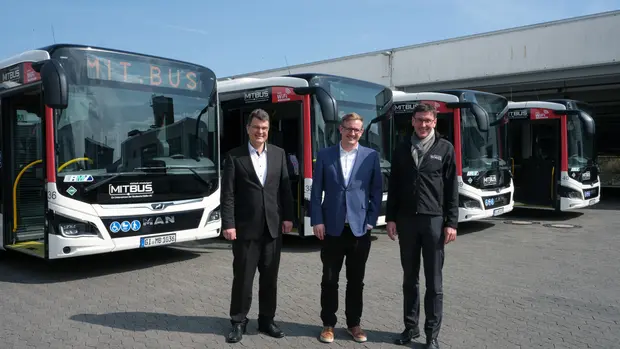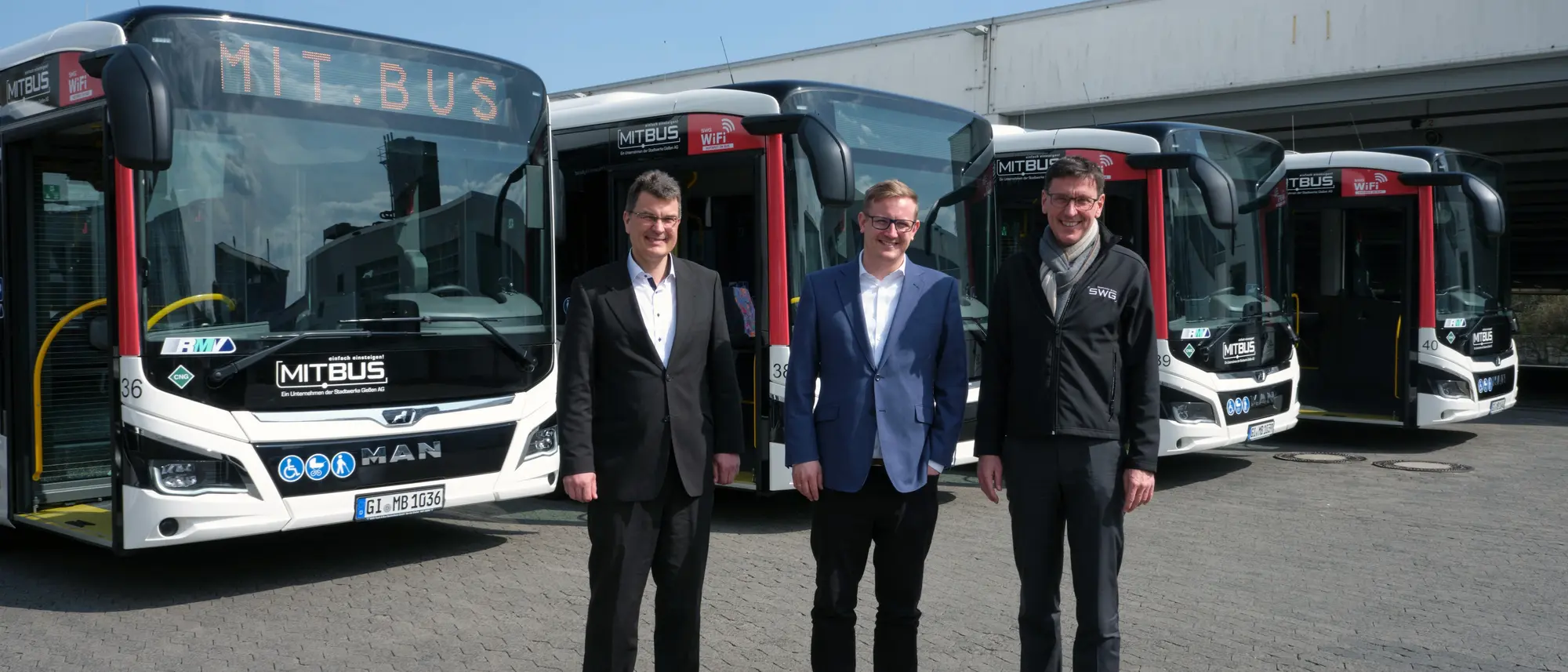
MIT.BUS is driving forward the transport revolution and has purchased five more articulated natural gas buses of the latest generation. This will enable the subsidiary of Stadtwerke Gießen to significantly reduce the already low emission values of its fleet even further.
MIT.BUS is continuing the modernisation of its fleet with the purchase of five more MAN Lion's City 18 C buses. From April 2023, the ultra-modern vehicles will replace the oldest articulated buses in the fleet. Like the entire fleet of the municipal utility subsidiary, the new buses run entirely on biomethane and are therefore virtually CO2-neutral. The vehicles boast efficient hybrid technology: an automatic start-stop system, which switches off the engine at bus stops and red lights, ensures significantly reduced emissions. The vehicle produces the electrical energy for these frequent starts itself - by recovering the braking force. Mathias Carl, Managing Director of MIT.BUS, explains: "A special generator produces electricity during each braking process, which is stored in a battery and can be used again when needed." Together with Jens Schmidt, Commercial Director of Stadtwerke Gießen (SWG), Alexander Wright, Chairman of the SWG Supervisory Board, and Councillor Gerda Weigel-Greilich, he presented the new vehicles to a wider public on Thursday, 6 April.
Significant fuel savings
Six natural gas buses of this type have already been in operation since the end of 2020 - and have fully met expectations in terms of fuel savings. This is because the modern articulated trains offer a number of technical advantages: Just one alternator instead of the usual two, as well as an engine with a displacement of just 9.5 litres instead of the previous 12 litres. This makes the vehicles considerably lighter - and also significantly more economical than their predecessor models. "The advanced technology and the lower unladen weight noticeably reduce fuel consumption," summarises Jens Schmidt. Extrapolated to the approximately 50,000 kilometres that a MIT.BUS vehicle covers in a year, the efficient new purchases save around 6,600 kilograms of fuel per year - with five buses, consumption is reduced by a whole 33,000 kilograms per year, or around 480,000 kWh, which in turn corresponds to a saving of around 43,000 litres of diesel.
Safe and comfortable
"In addition to climate protection, comfort and, of course, the safety of passengers and other road users also played a decisive role in the selection of the vehicle model," says Mathias Carl. In the modern buses, sufficient handrails with stop request buttons, integrated video surveillance and a turning assistance system that monitors poorly visible areas by camera provide additional protection. Further innovations are aimed at passenger comfort: Raised side windows ensure greater brightness in the passenger compartment, LED ambient lighting provides pleasant light at dusk and the low-slung grab rails make it easier to get on and off. The vehicles also have two wheelchair spaces.
Progress has its price
Highly efficient technology, modern design - all this comes at a price: with the purchase of the five new articulated trains, MIT.BUS is investing around 2.5 million euros in its fleet. "After around 14 years in service, the old vehicles have reached the end of their service life," says Jens Schmidt, explaining the investment. And indeed, the new vehicles leave their predecessors far behind in terms of climate protection, economy and functionality. "With this investment, Stadtwerke Gießen is once again focussing on sustainability and climate protection. And thus ensuring that our city's infrastructure is fit for the future in the long term," emphasises city councillor Gerda Weigel-Greilich. "We take our responsibility for achieving climate protection targets very seriously: this can be seen from the fact that the SWG vehicle fleet comprises one hundred per cent 'clean vehicles' in accordance with the 'Act on the Procurement of Clean Road Vehicles'," adds SWG Supervisory Board Chairman and Mayor Alexander Wright.

